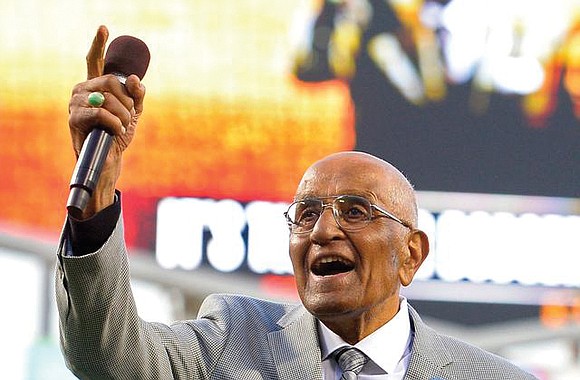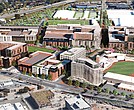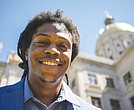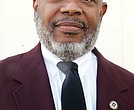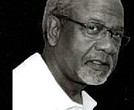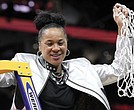Pitching legend Don Newcombe dies at 92
Fred Jeter | 3/1/2019, 6 a.m.
In the late 1940s, the Brooklyn Dodgers rattled baseball’s foundation by boldly breaking the color line. It was to be a major turning point in all professional sports.
Jackie Robinson led the way in 1947, followed in 1949 by pitcher Don Newcombe, aka “The Newk,” who also signed with the Dodgers. In 1949, he became the first African-American pitcher to start a World Series game, winning the Rookie of the Year Award.
Mr. Newcombe, a dominating right-handed pitcher on the short list of baseball’s greatest hurlers, died Tuesday, Feb. 19, 2019, in Santa Monica, Calif., at age 92 following a lengthy illness.
“Mentor at first, friend at the end, missed by everyone who got to know him,” pitching great Sandy Koufax said on the Dodgers’ website.
The burly 6-foot-4, 225-pound native of New Jersey is one of two pitchers — Justin Verlander is the other — to win Rookie of the Year (1949), the Cy Young Award and Most Valuable Player (both in 1956) trophies during their career.
“Newk was a big man in every way. He truly was a big man on and off the field and he will be missed by all,” said the Dodgers’ famed announcer Vin Scully.
Mr. Newcombe remained active at Dodgers functions through this past season and was known for his charming personality and snappy wardrobe.
Mr. Newcombe posted a 149-90 career record, was a four-time All-Star and helped the Dodgers to four World Series, including winning the 1955 title over the New York Yankees. He fanned a total of 1,129 batters while posting 136 complete games and 24 shutouts. His pinnacle season was 1956, going 27-7. In all, he had three seasons of 20-plus victories.
He was feared for his blazing fastball, sharp curve and his menacing stare. Batters rarely dug in close to the plate with the intimidating “Newk” on the mound.
Pace setters: By 1949, Brooklyn had four black players, Robinson, Newcombe, catcher Roy Campanella and pitcher Dan Bankhead. That was more than the rest of baseball combined. Other black pioneers joining Brooklyn by 1953 were Cuban Sandy Amoros, Joe Black and Junior Gilliam, NL Rookie of the Year in 1953.
Mr. Newcombe was actually the third black pitcher to reach the majors, following teammate Dan Bankhead and the legendary Satchel Paige with the Cleveland Indians.
Before Brooklyn: The son of a chauffeur, Mr. Newcombe grew up in Elizabeth, N.J., and went to Jefferson High School there. Because the high school didn’t offer baseball, Mr. Newcombe began playing semiprofessional ball while still a student. At 18, he signed with the Newark Eagles, a Negro League team. He played with the Eagles in 1944 and 1945, catching the eye of Brooklyn Dodgers owner Branch Rickey.
He signed with the Dodgers, playing first with the team’s farm club in Nashua, N.H., in 1946, becoming part of the first racially mixed pro team in the United States in the 20th century. He later played for another Dodgers’ farm team, the Montreal Royals in Canada, before joining the parent club in 1949.
Soldier duty: Mr. Newcombe missed the 1951 and 1952 seasons while serving in the Army during the Korean War. Those would have been prime seasons in which he would have likely won more than 40 more games.
A slugger, too: Had Mr. Newcombe not been such a fearsome pitcher, he’d have likely made it to the big leagues at another position. While he threw right-handed, he hit left-handed — and with considerable power. He was often used as a pinch hitter in games he didn’t pitch.
In 1955, he hit an astounding .359, with seven homers and 23 runs batted in. For his career, he hit .271 with 15 homers.
Also an excellent fielder, he twice compiled a perfect 1.000 percentage with the glove.
Legacy: Mr. Newcombe figures heavily into author Roger Kahn’s touching book “The Boys of Summer,” about the 1950s Dodgers.
Speaking at a fundraising event for U.S. Sen. Barbara Boxer of California in 2010, President Obama referred to Mr. Newcombe, who was in attendance, as “someone who helped make America what it is … I would not be here if it weren’t for Jackie, and if not for Don Newcombe.”
Also, Mr. Newcombe gets a mention in the classic song, “Talkin’ Baseball,” by Terry Cashman:
“We’re talkin’ baseball, Kluszewski, Campanella;
Talkin’ baseball, The Man and Bobby Feller;
The Scooter, the Barber and The Newk;
We knew ’em all from Boston to Dubuque;
Especially Willie, Mickey and The Duke.”
The Dodgers, which moved to Los Angeles in 1958, announced that all players will wear on their uniforms a No. 36 patch — Mr. Newcombe’s number — throughout the 2019 season.

